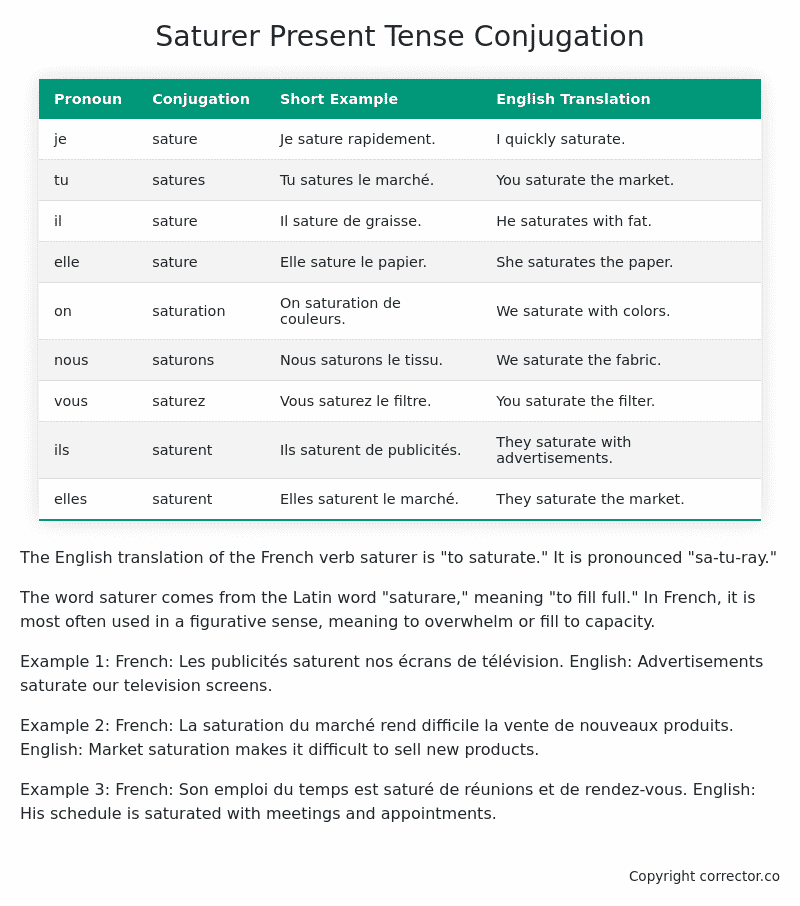Le Present (Present Tense) Conjugation of the French Verb saturer
Introduction to the verb saturer
The English translation of the French verb saturer is “to saturate.” It is pronounced “sa-tu-ray.”
The word saturer comes from the Latin word “saturare,” meaning “to fill full.” In French, it is most often used in a figurative sense, meaning to overwhelm or fill to capacity.
Example 1:
French: Les publicités saturent nos écrans de télévision.
English: Advertisements saturate our television screens.
Example 2:
French: La saturation du marché rend difficile la vente de nouveaux produits.
English: Market saturation makes it difficult to sell new products.
Example 3:
French: Son emploi du temps est saturé de réunions et de rendez-vous.
English: His schedule is saturated with meetings and appointments.
Saturer – About the French Present Tense
To take a deep dive into all the French tenses then see our article on Mastering French Tense Conjugation.
Common Everyday Usage Patterns For Le Present
Interactions with Other Tenses
Table of the Present Tense Conjugation of saturer
| Pronoun | Conjugation | Short Example | English Translation |
|---|---|---|---|
| je | sature | Je sature rapidement. | I quickly saturate. |
| tu | satures | Tu satures le marché. | You saturate the market. |
| il | sature | Il sature de graisse. | He saturates with fat. |
| elle | sature | Elle sature le papier. | She saturates the paper. |
| on | saturation | On saturation de couleurs. | We saturate with colors. |
| nous | saturons | Nous saturons le tissu. | We saturate the fabric. |
| vous | saturez | Vous saturez le filtre. | You saturate the filter. |
| ils | saturent | Ils saturent de publicités. | They saturate with advertisements. |
| elles | saturent | Elles saturent le marché. | They saturate the market. |
Other Conjugations for Saturer.
Le Present (Present Tense) Conjugation of the French Verb saturer (this article)
Imparfait (Imperfect) Tense Conjugation of the French Verb saturer
Passé Simple (Simple Past) Tense Conjugation of the French Verb saturer
Passé Composé (Present Perfect) Tense Conjugation of the French Verb saturer
Futur Simple (Simple Future) Tense Conjugation of the French Verb saturer
Futur Proche (Near Future) Tense Conjugation of the French Verb saturer
Plus-que-parfait (Pluperfect) Tense Conjugation of the French Verb saturer
Passé Antérieur (Past Anterior) Tense Conjugation of the French Verb saturer
Futur Antérieur (Future Anterior) Tense Conjugation of the French Verb saturer
Subjonctif Présent (Subjunctive Present) Tense Conjugation of the French Verb saturer
Subjonctif Passé (Subjunctive Past) Tense Conjugation of the French Verb saturer
Subjonctif Imparfait (Subjunctive Imperfect) Tense Conjugation of the French Verb saturer
Subjonctif Plus-que-parfait (Subjunctive Pluperfect) Tense Conjugation of the French Verb saturer
Conditionnel Présent (Conditional Present) Tense Conjugation of the French Verb saturer
Conditionnel Passé (Conditional Past) Tense Conjugation of the French Verb saturer
L’impératif Présent (Imperative Present) Tense Conjugation of the French Verb saturer
L’infinitif Présent (Infinitive Present) Tense Conjugation of the French Verb saturer
Struggling with French verbs or the language in general? Why not use our free French Grammar Checker – no registration required!
Get a FREE Download Study Sheet of this Conjugation 🔥
Simply right click the image below, click “save image” and get your free reference for the saturer Present Tense tense conjugation!

I hope you enjoyed this article on the verb saturer. Still in a learning mood? Check out another TOTALLY random French verb present conjugation!


